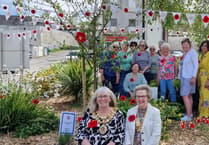FORESTRY England rangers are thanking the public for their patience as routine tree thinning gets underway at Cardinham Woods, outside Bodmin.
Work started on February 19 and will continue until mid-March. The forest is open to the public throughout the forestry work, but some of the woodland’s popular walking and cycling trails will be closed or diverted to allow crews to work safely.
Cardinham Woods manager, Sam Lebbern, explained: “Cardinham Woods is a working woodland producing sustainable timber and regular thinning is a vital part of sustainable woodland management. We are working in the Hurstock and Tawnamoor areas of the forest where the trees are growing very densely. This is a normal part of their lifecycle and now is the time to remove some of the trees to give the remaining ones the space they need to grow to their potential. Thinning the trees also lets more light onto the forest floor, which improves the habitat for ground flora and the wildlife it supports.
“Safety is our highest priority. We never take the decision to close a forest trail lightly but, on this occasion, it’s essential to keep visitors, staff, and contractors safe. The public can help us to finish working on time by following all signs and instructions, whether or not they can see or hear us working. Forestry work is very hazardous - a falling tree can weigh several tonnes and hit the ground at nearly 60 mph.
“As long as the weather conditions allow, we will finish working by mid-March, and will be ready to fully reopen all the trails in good time for the Easter Holidays.”
A spokesperson for Forestry England added: “Harvesting trees is an important part of sustainable forest management. Well managed forests support more wildlife. Before starting any forestry work, Forestry England carries out thorough ecological surveys to check for species such as birds, mammals, rodents, invertebrates, flora, and fungi.
“For example, Cardinham Woods is home to special species including dormice, bats, and birds of prey. Cardinham Woods is also classified as a Plantation on Ancient Woodland Site (PAWS) which means that Forestry England is managing it back to the way it would have been several hundred years ago.
“This process will take many years and involves gradually removing planted conifers and non-native trees while supporting native broadleaf trees to regenerate in their place.”

.jpeg?width=209&height=140&crop=209:145,smart&quality=75)


.jpeg?width=209&height=140&crop=209:145,smart&quality=75)
Comments
This article has no comments yet. Be the first to leave a comment.